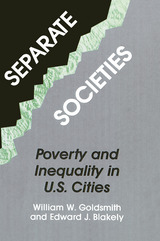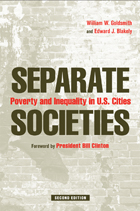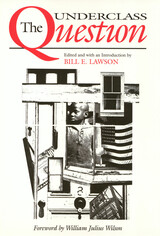

“Economic and political forces no longer combat poverty—they generate poverty!" exclaim William Goldsmith and Edward Blakely in their report on the plight of American's urban poor. In this revised and updated edition of their 1992 book Separate Societies,the authors present a compelling examination of the damaging divisions that isolate poor city minority residents from the middle-class suburban majority. They pay special attention to how the needs of the permanently poor have been unmet through the alternating years of promises and neglect, and propose a progressive turn away from 30 years of conservative policies.
Separate Societies vividly documents how the urban working class has been pushed out of industrial jobs through global economic restructuring, and how the Wall Street meltdown has aggravated underemployment, depleted public services, and sharpened racial and class inequalities.
The authors insist that the current U.S. approach puts Americans out of work and lowers the standard of living for all. As such, Goldsmith and Blakely urge the Obama administration to create better urban policy and foster better metropolitan management to effectively and efficiently promote equality.


It may seem to the casual observer that women have made striking gains in their quest for equality with men since the early 1960s. But have they really improved their lot? Are they really better off economically? In this clear, compact, and controversial book Victor Fuchs makes plain that except for women who are young, white, unmarried, and well educated, today’s women have not gained economically at all relative to men. He shows that although women are earning a lot more, they have much less leisure time than they used to while men have more; the decline of marriage has made women more dependent on their own income, and their share of financial responsibility for children has grown.
Scrutinizing this relative lack of progress and the reasons for the persistence of occupational segregation, the infamous wage gap, and the unequal responsibility for housework and childcare, Fuchs shows that the standard explanations—discrimination and exploitation by employers—are not the most important causes. Women’s weaker economic position results primarily from conflicts between career and family, conflicts that are stronger for women than for men. Fuchs assembles many different kinds of evidence to suggest that, on average, women feel a stronger desire for children than men do, and have a greater concern for their welfare after they are born. This desire and concern create an economic disadvantage for women, even women who never marry and never have children.
READERS
Browse our collection.
PUBLISHERS
See BiblioVault's publisher services.
STUDENT SERVICES
Files for college accessibility offices.
UChicago Accessibility Resources
home | accessibility | search | about | contact us
BiblioVault ® 2001 - 2024
The University of Chicago Press









